Related Research Articles

A virtue is a trait of excellence, including traits that may be moral, social, or intellectual. The cultivation and refinement of virtue is held to be the "good of humanity" and thus is valued as an end purpose of life or a foundational principle of being. In human practical ethics, a virtue is a disposition to choose actions that succeed in showing high moral standards: doing what is right and avoiding what is wrong in a given field of endeavour. When someone takes pleasure in doing what is right, even when it is difficult or initially unpleasant, they can establish virtue as a habit. Such a person is said to be Virtuous through having cultivated such a disposition. The opposite of virtue is vice, and the vicious person takes pleasure in habitual wrong-doing to their detriment.
Civics is the study of the rights and obligations of citizens in society. The term derives from the Latin word civicus, meaning "relating to a citizen". The term relates to behavior affecting other citizens, particularly in the context of urban development.
Loyalty is a devotion to a country, philosophy, group, or person. Philosophers disagree on what can be an object of loyalty, as some argue that loyalty is strictly interpersonal and only another human being can be the object of loyalty. The definition of loyalty in law and political science is the fidelity of an individual to a nation, either one's nation of birth, or one's declared home nation by oath (naturalization).
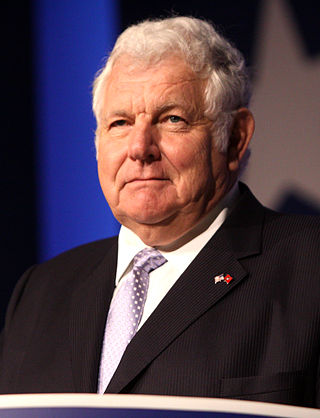
William John Bennett is an American conservative politician and political commentator who served as secretary of education from 1985 to 1988 under President Ronald Reagan. He also held the post of director of the Office of National Drug Control Policy under George H. W. Bush.

Virtue ethics is an approach to ethics that treats virtue as central.
Michael Hague is an American illustrator, primarily of children's fantasy books.

Arete is a concept in ancient Greek thought that, in its most basic sense, refers to "excellence" of any kind—especially a person or thing's "full realization of potential or inherent function." The term may also refer to excellence in "moral virtue."
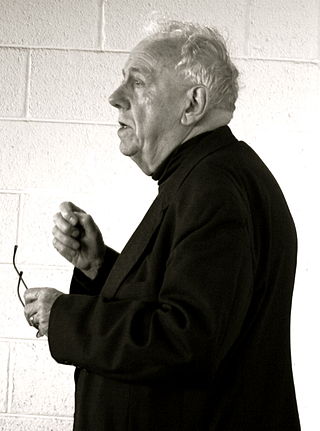
Alasdair Chalmers MacIntyre is a Scottish-American philosopher who has contributed to moral and political philosophy as well as history of philosophy and theology. MacIntyre's After Virtue (1981) is one of the most important works of Anglophone moral and political philosophy in the 20th century. He is senior research fellow at the Centre for Contemporary Aristotelian Studies in Ethics and Politics (CASEP) at London Metropolitan University, Emeritus Professor of Philosophy at the University of Notre Dame, and permanent senior distinguished research fellow at the Notre Dame Center for Ethics and Culture. During his lengthy academic career, he also taught at Brandeis University, Duke University, Vanderbilt University, and Boston University.
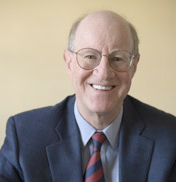
William Damon is a psychologist who is a professor at Stanford University and senior fellow at Stanford University's Hoover Institution. He is one of the world's leading scholars of human development. Damon has done pioneering research on the development of purpose in life and wrote the influential book The Path to Purpose. Damon has helped design innovative developmental methods such as peer learning. Damon also is known for his studies of effective philanthropy. His current work includes a study exploring purpose in higher education and a study of family purpose across generations. Dr. Damon writes on intellectual and social development through the lifespan. Damon has been elected to the National Academy of Education and the American Academy of Arts and Sciences. He has been designated one of the fifty most influential living psychologists in the world today.

Civic virtue is the harvesting of habits important for the success of a society. Closely linked to the concept of citizenship, civic virtue is often conceived as the dedication of citizens to the common welfare of each other even at the cost of their individual interests. The identification of the character traits that constitute civic virtue has been a major concern of political philosophy. The term civility refers to behavior between persons and groups that conforms to a social mode, as itself being a foundation of society and law.
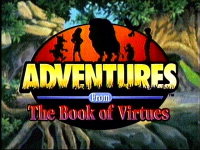
Adventures from the Book of Virtues is an American animated children's television series based on the books The Book of Virtues: A Treasury of Great Moral Stories, and The Children's Book of Virtues, both by William Bennett, who served as Secretary of Education under President Ronald Reagan. The program focuses on two main human characters, Annie and Zach, who learn many life lessons from their friends Plato the bison, Aurora the red-tailed hawk, Aristotle the prairie dog, and Socrates the bobcat. These lessons are told in the form of animated segments based on stories from a variety of origins including Bible stories, fairy tales, fables, mythology, and folk stories from diverse cultures.

The Classic of Filial Piety, also known by its Chinese name as the Xiaojing, is a Confucian classic treatise giving advice on filial piety: that is, how to behave towards a senior such as a father, an elder brother, or a ruler.
Robert Coles is an American author, child psychiatrist, and professor emeritus at Harvard University.
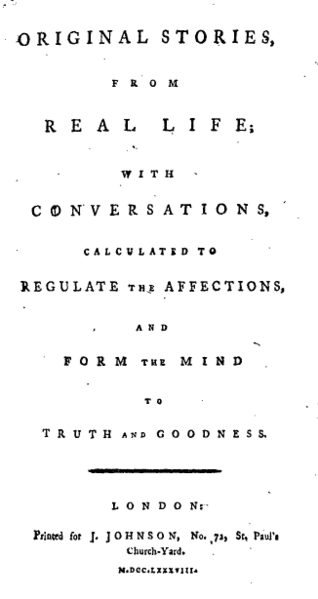
Original Stories from Real Life; with Conversations Calculated to Regulate the Affections, and Form the Mind to Truth and Goodness is the only complete work of children's literature by the 18th-century English feminist author Mary Wollstonecraft. Original Stories begins with a frame story that sketches out the education of two young girls by their maternal teacher Mrs. Mason, followed by a series of didactic tales. The book was first published by Joseph Johnson in 1788; a second, illustrated edition, with engravings by William Blake, was released in 1791 and remained in print for around a quarter of a century.

Thoughts on the education of daughters: with reflections on female conduct, in the more important duties of life is the first published work of the British feminist Mary Wollstonecraft. Published in 1787 by her friend Joseph Johnson, Thoughts is a conduct book that offers advice on female education to the emerging British middle class. Although dominated by considerations of morality and etiquette, the text also contains basic child-rearing instructions, such as how to care for an infant.
Falkner (1837) is the penultimate book published by the author Mary Shelley. Like Shelley's earlier novel Lodore (1835), it charts a young woman's education under a tyrannical father figure.

William Andrus Alcott, also known as William Alexander Alcott, was an American educator, educational reformer, physician, vegetarian and author of 108 books. His works, which include a wide range of topics including educational reform, physical education, school house design, family life, and diet, are still widely cited today.

Baldassare Castiglione, Count of Casatico, was an Italian courtier, diplomat, soldier and a prominent Renaissance author.
Darcia Narvaez is a Professor of Psychology Emerita at the University of Notre Dame who has written extensively on issues of character, moral development, and human flourishing.
Nancy E. Snow is a professor of philosophy specializing in ethics and the director of the Institute for the Study of Human Flourishing at the University of Oklahoma. Prior to her move to Norman, she was a professor of philosophy at Marquette University. In 2022, she will move to the University of Kansas.
References
- ↑ Bill Bennett on Education Reform, the Book of Virtues, & the War on Drugs. Conversations with Bill Kristol. Bill Bennett Transcript.